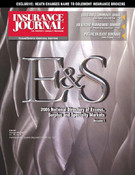In an ongoing effort to charge accurate insurance rates, carriers are increasingly looking to the use of consumers’ credit information as an aid in determining underwriting, tier placement, rating and/or payment plan eligibility.
The Texas Department of Insurance completed a report on the preliminary findings of a recently conducted and legislatively mandated study on the use of credit scores by insurers. The study analyzed policyholders’ individual data to determine whether credit scores are an effective predictor of risk and examined the impact of this practice on consumers.
The results showed what appears to be a strong relationship between credit scores and claims exposure. They also indicated a disparate impact on low income and minority consumers. Reacting to TDI’s report, supporters of the use of credit scores in insurance rating emphasized the findings regarding the credit/claims relationship, while critics seized upon the study’s implication that their use is unfair to certain sectors of society.
Insurance Council of Texas spokesman Mark Hanna said, “The use of credit scores is all about charging more accurate rates. TDI’s study confirms that people with bad credit scores are twice as likely to have an accident than drivers with good credit scores.”
When credit scores are used as rate determinants, the consumer can, in some measure, control the costs according to Hanna, “Credit scores are an underwriting factor that an individual can control and improve. By paying bills on time and managing their finances, policyholders can see a marked improvement in their credit score, which can lead to better insurance rates.”
The National Association of Mutual Insurance Companies feels the study confirms what has been known for a long time. “The insurance industry and independent experts have repeatedly demonstrated that insurance scores are predictive of loss,” NAMIC state affairs director Neil Aldridge said. “Using [credit scoring] allows insurers to more accurately price products, providing more consumer choice in the market.”
Dave Snyder, vice president, American Insurance Association stated, “The report shows that insurers use credit information in different ways thereby giving consumers the power to choose an insurer and the type of policy that best fits. Choice is a positive outcome in a competitive market.”
Critics see unintended negative side effects and feel insurance credit scoring should not be used, even if the study showed that using credit scores could help predict losses. They allege the problems with credit scoring are so great it should be prohibited.
“Credit scoring is inherently unfair and has a disproportionate impact on consumers in poor and minority communities,” said Birny Birnbaum, executive director of the Center for Economic Justice based in Austin. “It penalizes consumers for rational behavior, sound financial management and business decisions unrelated to payment history.”
The center published its own report that declared, “Credit scores have nothing to do with financial responsibility. Credit scores can vary from good to bad depending upon which bureau provides the insurer with the information. It’s possible to get a low score with a perfect payment record.”
But that does not mean scores are not predictive.
“It’s a public policy issue,” Brian Sullivan, editor, Auto Insurance Report said. “It’s very hard to argue it’s not predictive–it is predictive. But is it fair? Whether it is fair or not is a matter of opinion, not a matter of fact.”
Sen. Rodney Ellis, D-Houston, said legislation banning the practice would be filed in both the House and Senate. Ellis also called on the insurance commissioner to stop the practice.
“Most right-thinking people just have a basic visceral notion that credit scores are something that ought to not be used in determining what somebody’s rate ought to be or how much they ought to pay in insurance,” said Ellis, who was joined by several other lawmakers.
The Property Casualty Insurers Association of America feels the preliminary findings are far from conclusive and urge lawmakers to reserve judgment until a more detailed analysis of the study is conducted.
Was this article valuable?
Here are more articles you may enjoy.


 The $3 Trillion AI Data Center Build-Out Becomes All-Consuming for Debt Markets
The $3 Trillion AI Data Center Build-Out Becomes All-Consuming for Debt Markets  Chubb CEO Greenberg on Personal Insurance Affordability and Data Centers
Chubb CEO Greenberg on Personal Insurance Affordability and Data Centers  Lawyer for Prominent Texas Law Firm Among Victims ID’d in Maine Plane Crash
Lawyer for Prominent Texas Law Firm Among Victims ID’d in Maine Plane Crash  Allstate CEO Wilson Takes on Affordability Issue During Earnings Call
Allstate CEO Wilson Takes on Affordability Issue During Earnings Call 


